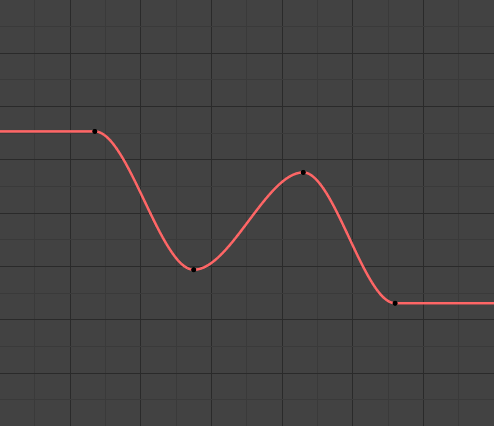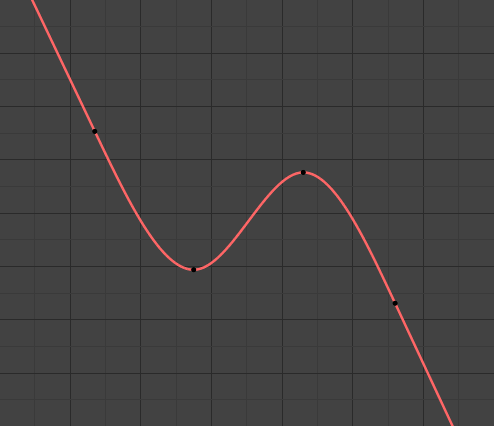Editing
Delete Channels
Reference
- Menu:
- Shortcut:
X
Deletes the whole channel from the current action (i.e. unlink the underlying F-Curve data-block from this action data-block).
Warning
The X shortcut is area-dependent: if you use it in the left list part, it will delete the selected channels, whereas if you use it in the main area, it will delete the selected keyframes.
Un/Group Channels
Reference
- Menu:
- Shortcut:
Ctrl-Alt-G, Ctrl-G
Un/Groups the selected channels into a collection that can be renamed by double clicking on the group name. For example, this helps to group channels that relate a part of an armature to keep the editor more organized.
Toggle/Enable/Disable Channel Settings
Reference
- Menu:
- Shortcut:
Shift-W, Shift-Ctrl-W, Alt-W
Enable/disable a channel’s setting (selected in the menu that pops up).
- Protect, Mute
Todo.
Toggle Channel Editability
Reference
- Menu:
- Shortcut:
Tab
Locks or unlocks a channel for editing.
Extrapolation Mode
Reference
- Menu:
- Shortcut:
Shift-E
Change the extrapolation between selected keyframes.
Extrapolation defines the behavior of a curve before the first and after the last keyframes.
There are two basic extrapolation modes:
- Constant:

Constant extrapolation.
The default one, curves before their first keyframe and after their last one have a constant value (the one of these first and last keyframes).
- Linear:

Linear extrapolation.
Curves ends are straight lines (linear), as defined by the slope of their first and last keyframes.
Additional extrapolation methods (e.g. the Cycles modifier) are located in the F-Curve Modifiers.
Add F-Curve Modifier
Reference
- Menu:
- Shortcut:
Shift-Ctrl-M
Opens a pop-up allowing you to add modifiers to the active F-Curve. Settings for the modifier can be found in the tab.
Show/Hide
- Hide Selected Curves H
Hides the selected curves.
- Hide Unselected Shift-H
Show only the selected curve (and hide everything else).
- Reveal Curves Alt-H
Show all previous hidden curves.
Expand/Collapse Channels
Reference
- Menu:
- Shortcut:
NumpadPlus, NumpadMinus
Expands or collapses selected channels.
Move
Reference
- Menu:
This allows you to move selected channels up/down PageUp, PageDown, or directly to the top/bottom Shift-PageUp, Shift-PageDown.
Revive Disabled F-Curves
Reference
- Menu:
Clears “disabled” tag from all F-Curves to get broken F-Curves working again.
Frame Selected Channels
Reference
- Menu:
- Shortcut:
NumpadPeriod
Reset viewable area to show the selected channels. To frame the channel that is under the mouse cursor, use Alt-MMB.
- Include Handles
Include handles of keyframes when calculating extents.
- Use Preview Range
Ignore frames outside of the preview range.
Keys to Samples
Reference
- Menu:
- Shortcut:
Alt-C
This operator replaces an F-Curve with a set of sampled points at each full frame. It is a destructive process that removes the ability to edit the curve. The main use for this is to reduce the file size with large datasets. Samples are only 1/5th the size per key. The sampled points interpolate linearly on subframes.
Samples to Keys
Reference
- Menu:
This operator replaces a sampled F-Curve with keyframes, adding the ability to edit it. It will not recreate the curve as it was before, instead it will place 1 key at every frame.
Sound to Samples
Reference
- Menu:
The Sound to Samples operator takes a sound file and uses its sound wave to create the animation data. By default this data will not be editable, use Samples to Keys to get editable keyframes.
- Lowest Frequency
Cutoff frequency of a high-pass filter that is applied to the audio data.
- Highest Frequency
Cutoff frequency of a low-pass filter that is applied to the audio data.
- Attack Time
Value for the hull curve calculation that tells how fast the hull curve can rise. The lower the value the steeper it can rise.
- Release Time
Value for the hull curve calculation that tells how fast the hull curve can fall. The lower the value the steeper it can fall.
- Threshold
Minimum amplitude value needed to influence the hull curve.
- Accumulate
Only the positive differences of the hull curve amplitudes are summarized to produce the output.
- Additive
The amplitudes of the hull curve are summarized. If Accumulate is enabled, both positive and negative differences are accumulated.
- Square
Gives the output as a square curve. Negative values always result in -1, and positive ones in 1.
- Square Threshold
All values lower than this threshold result in 0.
Discontinuity (Euler) Filter
Reference
- Menu:
Todo.